MICHAEL FRANTI & SPEARHEAD / “A Little Bit Of Riddim”
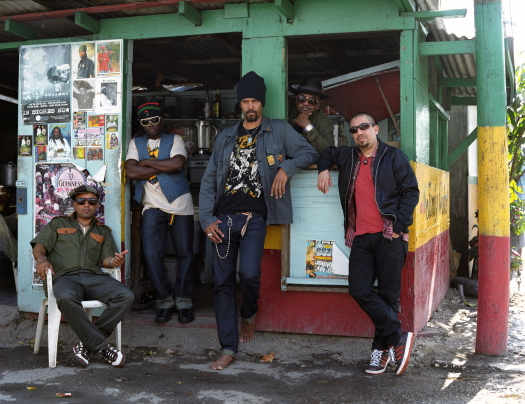
They been up in Jamaican yard, recording with Sly & Robbie. That new, shine eyed gal, Cherine Anderson, who can really, really sang (although she is not given much space to blow on this record, she makes her presence felt), she a been with them too. Spearhead all a rocking out, like Jimi (Hendrix, that is) mash up with jungle drums. Bass & drumming it out but with a twist of reggae.
This ain’t your parents music. But, they might like some of it too.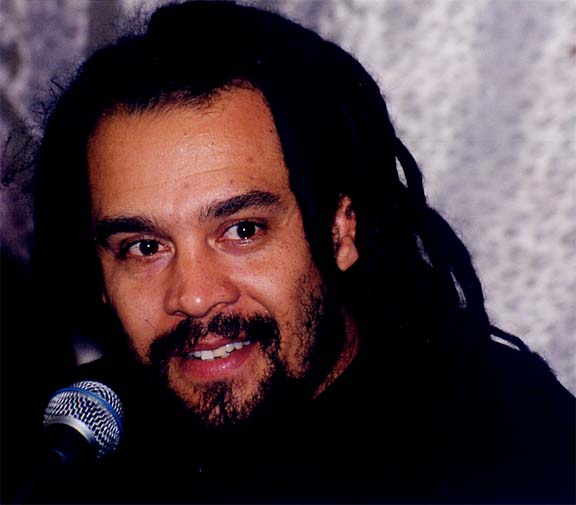
The general consensus seems to be—if what the critics say is true (the people is still weighing in): this ain’t the best Franti done so far (some favor Yell Fire, others go with Stay Human); which right there tell you where folks is at.
The Yell Fire crowd stomping their earth boots. The Stay Human groupies dancing bare foot on the grass. Some tie their laces together and hang shoes round their necks; dance a bit before heading back to the front lines. There is a vibe here for all of them.
Little voice telling me: it ain’t got to be best to be good. And All Rebel Rockers is some good shit.
—Kalamu ya Salaam
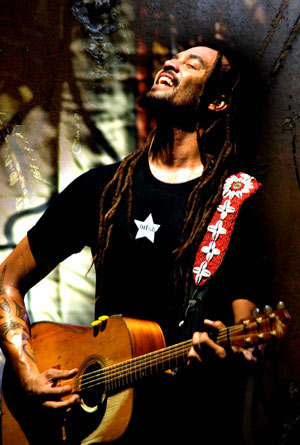
I’ve tried to continue to grow, both as a group and as an artist and as we’ve grown we learn things about music and about ourselves. And we try to learn from watching how audiences respond. The music has become, for lack of a better word, more musical. There was a time when we used to just program a beat and I would rhyme over it and know I try to spend a lot of time just sitting at the piano or the guitar, working on chords and song structure and getting the song sounding the way we want it to, just on acoustic guitar. And then from there adding a rhythm to it.
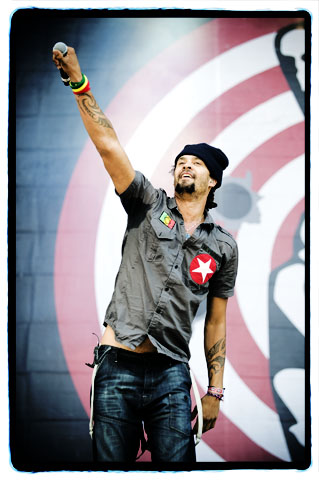
When I first started, you know I didn’t really intend to be making music. I just was writing lyrics and I started hanging out with the guys from the Beatnigs. We worked in this cake factory together, me and the drummer. We used to package these cakes, and the cake packaging machine was like this pneumatic glue gun that glued these cardboard boxes together and that’s what we did all day long. And it had this rhythm to it as you were operating it and I would write lyrics to that rhythm and that’s how we got involved in thinking about this industrial sound of rhythms. So then we started going out to the shipyards and banging on pieces of metal. And rehearsing out there because we didn’t have any place to rehearse. And then with Disposable Heroes I started taking the same kind of industrial sounds, and sampling and using drum machines to create heavy beats. And at that time I started working with Charlie Hunter. I was working at this place called Subway Guitars in Berkeley. And learning how to build instruments there. He came in and he was the only guitar player I every saw walk in with a basketball under his arm. So, I thought ‘this guy’s cool, I gotta make some music with him’. So, we started performing together as a duo and then started working on the Disposable Heroes Album. Charlie was really the one who turned me onto chords. For the first time,I could sing a line and if Charlie changed the chord I could here how it almost made my voice sound like I was singing a different melody just by changing the chord structure underneath it. So, he was the one who taught me that and when we started Spearhead he worked on a lot of the sessions with me and that’s when I decided I want to make music with live instruments and start a live band.
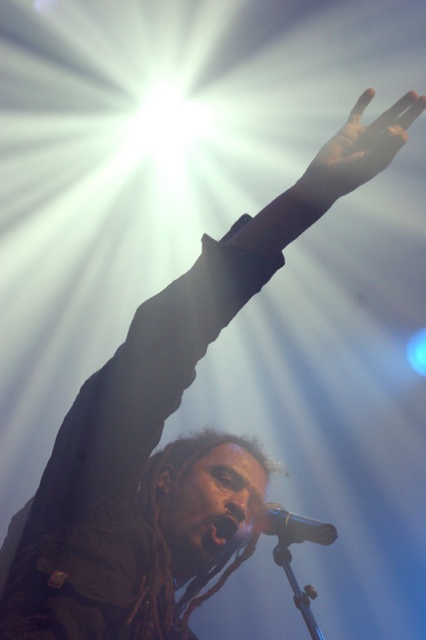
I always try to write the hook of the song fist. Because it’s really hard to write a verse and then go ‘Oh, God, where’s the chorus?’ If you start with the chorus then you have something worth repeating and it’s kind of catchy then you can always write backwards and work through the verses. So, all of my songs come from moments of inspiration like ‘oh, wow, that really works. That’s a clever pairing of words’. So, I keep my ears open. They all come from something I might hear somebody say on a bus or something. And I might read two bits of graffiti in a bathroom wall that weren’t supposed to go together but they work great. Anything, really.
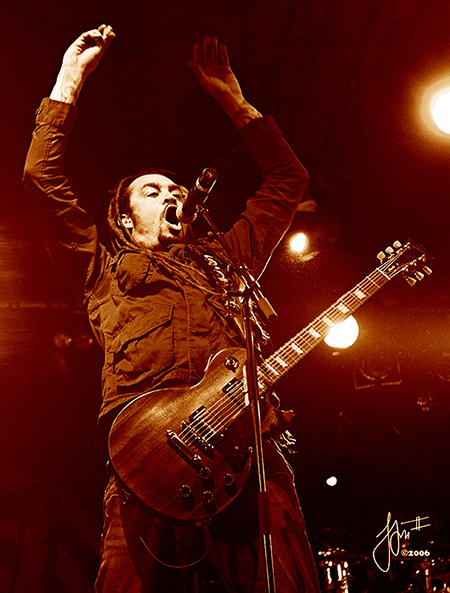
You know, when I first started my lyrics were really angry because I felt so powerless in the world. I felt like ‘man, I see all of these things that are happening around me, there’s nothing I can do about it. So, I’m just going to raise my voice as loud as I can.’ And that felt good to me, you know? And then over time I started to realize there’s ways that I could become involved directly. I can go and visit in prisons and sit down with people who are locked up for twenty-five years. I can go to schools and talk to young people. I can get involved politically at demonstrations around the world. And I can become more involved in my community in San Francisco. And I can help to have effect and become active. And as I became more active my songs changed. Because they went from things that were me just lashing out against the system to songs that once I realized I could have a voice in the world, now it became more important to write songs of tenacity, songs of inspiration, songs that were going to keep us alive in this movement that we’re all a part of. So that’s what I try to do today. Half of the songs are things that are going on in the world, and half are things that are going on inside our hearts. I’m trying to write songs that just lift us up. Listening to Aaron Neville today – we’re doing a show tonight with the Blind Boys of Alabama – singing ‘People Get Ready’ and I’m here a sound check and he’s just got his big parka on, he just walked in off the street, he’s got his glasses on and he’s just singing this beautiful song and I’m just sitting here moved to tears just hearing him and one of the Blind Boys sing this song. And I’m just so inspired just from hearing him sing a few bars and those are the songs that I aspire to.
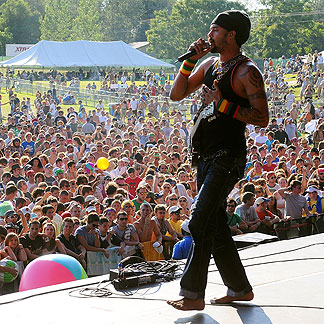
Well, for better or worse I’m in this business willingly of selling records. And so there is now way around it, you want your record to be everywhere it can possibly be sold. You hope as many people who like it can find it. So, you go out and promote your record and do interviews and tour and do all of those things. That’s the business side of it, but what goes into the music and what goes into the performance on stage and what goes into the song writing, it’s up to each artist to decide how they want to creat their music. Are they trying to create an image that works on MTV? Are they trying to create a beat that they know is just the next edition to last week’s beat? Or are you really digging into your soul and trying to put something in there that other people can relate to. And not really worry about the whims of fashion so much as you are concerned about getting in touch with that place inside you. I try to write songs from my heart so that if I listen back to songs that I wrote ten years ago I can say ‘hey, this is what I was feeling then’ and I can still feel the emotion in it. I always say ‘I don’t know if music can change the world overnight. But I know it can help us make it through a difficult night.’ And that’s the real aspiration I have as a songwriter.
—Michael Franti
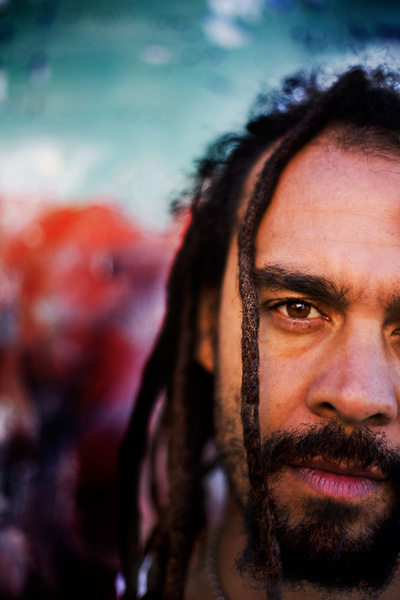
I was born to a mother who’s Irish, French and German and a father who’s African and Native American. And my mother gave me up for adoption because she felt her family would never accept a brown baby. I was raised in a family with two Finnish parents who had three kids of their own, and they adopted me and another black son. My whole life, I felt I was kind of the underdog or the outsider, even in my own family. So I’ve always identified with people who were that way. And really, what I found is that all of us feel that way at times.
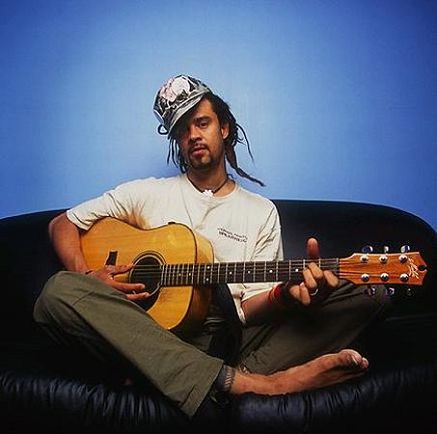
My musical experience started from wanting to speak up for the underdog. I started writing poetry in college, and then I started my first band, The Beatnigs, and it was really a kind of conscious poetry.
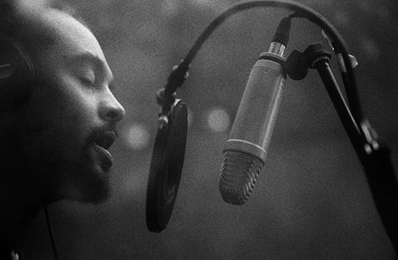
When I first started writing, my work was really political and gradually it’s become more personal. I feel like the two now are the same thing. Because ultimately, I want people to go away from a concert feeling connected to each other. When you really connect, it’s not on an analytical level. It’s not like a political discussion or an economic discussion; it’s a feeling. When I write songs, I aim for that. And I found the more I invest personally into the song, the more easily people connect.
—Michael Franti
This entry was posted on Monday, December 8th, 2008 at 1:01 am and is filed under Contemporary. You can follow any responses to this entry through the RSS 2.0 feed. You can leave a response, or trackback from your own site.
One Response to “MICHAEL FRANTI & SPEARHEAD / “A Little Bit Of Riddim””
March 4th, 2011 at 5:24 am
Man, for some reason it’s like if i have heard of you before because when i heard your music i saw Bob in you! I’m an artist so check-out my art. i would love to do one of your album covers. Much respect…
Leave a Reply
| top |